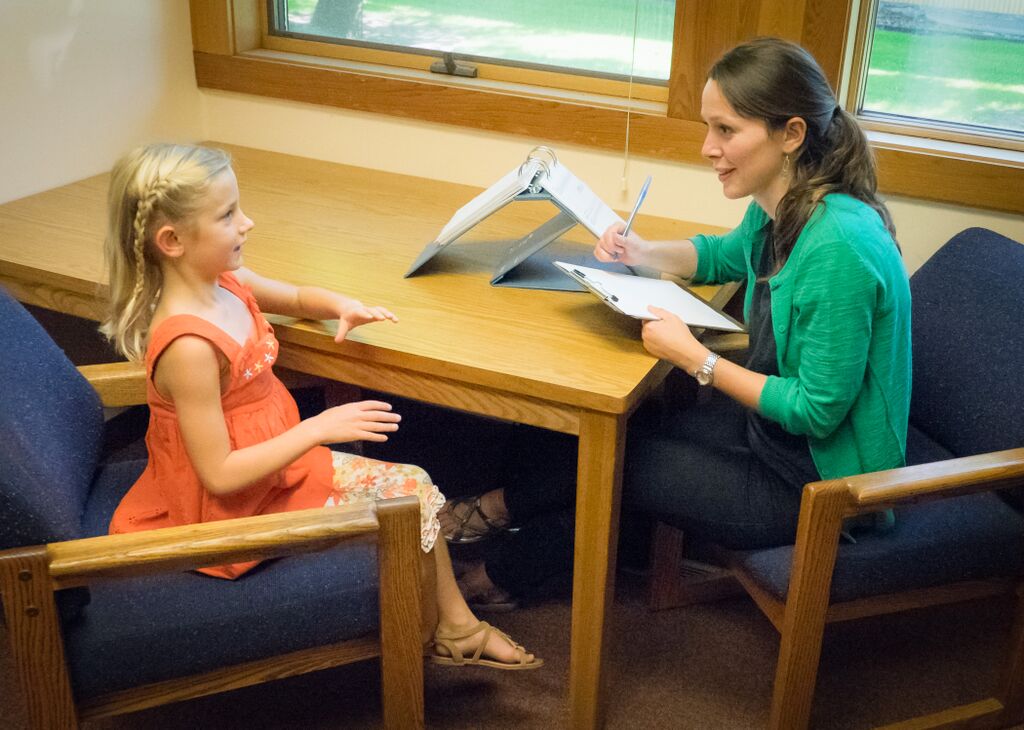Curriculum and Clinical Training
Through our strong commitment to a scientist-practitioner model, the Specialist in School Psychology Program provides comprehensive training through coursework and clinical training. The SSP Program requires approximately 69 credit hours and entails a three-year course of study. The first two years consist of full-time coursework and school-based practica experiences. During the third year, students will complete a one-year internship in a school setting. Students must also pass a written comprehensive examination at the end of their second year on campus.

Students in the School Psychology Program also have a number of opportunities to develop their clinical skills with children and their families. Practicum course seminars focus on professional and ethical issues, as well as skills and knowledge of assessment, treatment/intervention, and consultation. The program emphasizes the development of cultural competence skills to effectively work with children and families from culturally and linguistically diverse backgrounds. Emphasis is also placed on promoting a student’s strengths and supporting all students through the problem solving model and Response to Intervention (RTI).
The Specialist in School Psychology (SSP) program requires approximately 69 credit hours and entails a three-year course of study. The first two years consist of full-time coursework and school-based practica experiences. During the third year, students will complete a one year internship in a school setting. Students must also pass a written comprehensive examination at the end of their second year on campus.
SSP students typically complete paid internships in public school district. NASP requires a 1,200 hour internship, with at least 600 hours completed in a school setting.
The following is an example of program coursework that may be subject to change. Your program advisor will consult with you before each semester in regards to courses.
* Electives do not substitute for any core classes -- these are "extra"
** These courses are also offered during some summer sessions and can be taken then to lighten the regular semester course load. Please check to confirm summer offerings.
*** Please note that students entering in the fall of an even year, C&I 514 will need to be taken during one of the summer sessions or fall of the second year to avoid a course overload in spring of the second year. However, if able to take C&I 504 during a summer session (odd summer), this will allow for C&I 524 during the spring of the second year.
Specialist students in school psychology complete practicum requirements during their first 2 years in the program. In their final year, SSP students complete a school-based internship per requirements from the National Association of School Psychologist. Students are required to complete a 1200-hour internship in the final year of the program, with at least 600 hours completed in a school setting. SSP students at the University of Montana typically complete paid internships in public schools in Montana or internships in other states.
SSP students in the School Psychology program complete practicum and field work experiences in local K-12 settings. These experiences immerse students in the culture and operation of school, and familiarize students with the roles and functions of school staff (e.g., principal, speech therapists, teachers, social workers). Students observe in the classrooms, during intervention team meetings, interdisciplinary team meetings, parent conferences, and teacher meetings. Students also participate more directly in their school placements through activities such as conducting academic assessments and systematic observations, implementing evidence-based academic and behavior interventions, and supporting the school psychologist in cognitive abilities testing.
Practicum sites are located in Missoula and surrounding areas. The program has an emphasis in working with children and families from rural and tribal communities. Students have an opportunity to learn about the provision of assessment, intervention, and consultation services to children and families from diverse socioeconomic and cultural backgrounds.
Examples of practicum sites:
In addition to the formalized methods of obtaining practicum experience, there are numerous other activities throughout the academic year and summer for students. Due to the lack of services in the community and state for children with Autism Spectrum Disorders (ASD), the program has established a strong relationship with the University's Department of Communicative Sciences and Disorders RiteCare Clinic. Graduate students in school psychology and speech-language pathology collaborate in conducting assessments and using evidence-based interventions for children referred to the RiteCare Clinic for ASD.

In their third year of the Specialist in School Psychology Program, students are required to complete a 1200-hour school-based internship.
Examples of internship placements that our SSP students have attended include:
In Montana:
- Missoula Area Education Cooperative
- Helena Public Schools
- Great Falls Public Schools
- Gallatin-Madison Educational Co-op
- Glasgow School District
- Prickly Pear Educational Co-op
- Lewistown School District
- Bitterroot Valley Educational Co-op
- Belgrade School District
- Anaconda Public Schools
Outside Montana:
- Granite School District, Salt Lake City, Utah
- Davis School District, Salt Lake City, Utah
- Independent School District #318
- Mount Vernon School District, Mount Vernon, Washington
- San Juan Colorado Co-op, Colorado
- Kodiak Island Borough School District, Alaska
- Mat-Su Borough School District, Alaska
Students are evaluated at the end of each semester about their progress in the program in the program related to training objectives. Students and faculty use these evaluations to collaboratively set student professional development goals for the subsequent semester. There are a number of ways students are evaluated for skill building and integration of professional skills throughout the training period via coursework, practica, comprehensive exams, research and presentation opportunities.
Prior to Admittance
- Review of all application materials
- Interviews via phone or in-person
- Faculty feedback
Year 1
- Grades of B or better in all required coursework
- Faculty mid and year-end evaluations and feedback
- Semester 1 & 2 practica evaluations
- Monthly reflection, Self-Assessment
Year 2
- Grades of B or better in all required coursework
- Faculty mid and year-end evaluation and feedback
- 3rd and 4th semester practica supervisor and consumer evaluations
- Consumer mid and year-end evaluation
- Professional school-based practica portfolio
- Monthly reflections and self-assessment
- Satisfactory completion of Masters Comprehensive Exam
- Masters of Arts Degree awarded
- Eligible for Montana Class 5 School Psychology License
Year 3
- Satisfactory completion of internship requirements
- Monthly faculty supervision
- School-site supervision mid and year-end evaluation
- Consumer mid and year-end evaluation
- Professional internship portfolio
- Pass National Credential in School Psychology (NCSP) Exam
- Awarded SSP degree
- Eligible for Montana Class 6 School Psychology License
- Apply for NCSP
Year 4
- Employment data
- Post Graduation Survey
Although fingerprinting and a criminal background check are not required by either the University of Montana or the School Psychology Program, individuals working in the public school systems are often required to present their criminal background check status prior to working in the schools. Since our graduate students are placed in public school classrooms during their training, we ask that newly admitted students arrange to be fingerprinted and submit to a background check through the State of Montana, Department of Criminal Justice. Newly admitted students receive a letter to this effect and directions on how to initiate the background check shortly after an admission offer is accepted. It is expected that this procedure can be completed prior to the fall semester so that placement in the schools can take place. A student cannot be placed in the schools without the background clearance.
In cases in which a background check shows past charges and convictions of concern, the case will be reviewed by a committee composed of the core school psychology faculty, and possibly the legal counsel for the University and other faculty, such as the Psychology Department Chair, if needed. Convictions that jeopardize the student's ability to be positioned in programmatic placements or obtain future employment in the field can lead to dismissal from the program.
